- Home
- V. E. Schwab
Gallant Page 4
Gallant Read online
Page 4
“Hurry up,” she says.
It is hardly the welcome she expected, but Olivia gathers her suitcase and steps inside, and the door swings shut behind her, walling off the night.
The master of the house is not alone.
He has three shadows, one short, one thin, one broad, and they watch as he rises from his chair, falling silently behind as shadows do.
There is a space between the second and the third, and a keen observer might guess that once, perhaps, there had been four. Perhaps, but now there are only three, and they follow their master as he makes his way through the house that is and is not empty.
There are dead things watching from the corners. Things that once were human. They bow their ghoulish heads and shrink back as the master and his shadows pass, making themselves small in the hollows of the house. Now and then, one glances up and glares, eyes sharp. Now and then, one remembers how they came to be in there in the dark.
The master drags his nails against the wall and hums, the sound carrying like a draft. There are other noises—the wind outside whispers through the tattered curtains, and a piece of plaster cracks and crumbles free, and the whole place seems to groan and tilt and sink—but the ghouls are silent, and the shadows cannot speak, so his is the only voice that carries through the house.
Part Two
The House
Chapter Five
Olivia has never been in such a house.
The foyer arches like the bones of some great beast, and lamps fill the space with soft yellow light, and she looks around, marveling at everything she sees: the grand staircase, the high ceilings and ornate floors. Her eyes skip from painting to pattern, wallpaper to rug to glass to door as Hannah ushers her out of the foyer and down the hall into a sitting room, two chairs and a sofa arranged before the fire. Olivia scans the room, searching the edges of her sight, but there are no teeth, no eyes, no signs of ghouls. She looks to Hannah and Edgar, expecting one of them to fetch her uncle, but they just stand in the doorway, trading quick, hushed words as if she cannot hear.
“Just read it,” says Hannah, pressing the letter into his hands.
“It makes no sense.”
“Did Arthur even know . . .”
“He would have said something. . . .”
Edgar frowns. “She looks just like—”
“Grace.”
There is an ache in the way Hannah says the name, and in that moment she knows—she knows—that the G on the front of her mother’s journal, the one worn to nothing by her fingertips, stood not for Georgina, or Genevieve, or Gabrielle, but Grace. Relief pours through her. They knew her mother. Perhaps they know what happened to her.
“Olivia,” says Edgar, as if testing out the name. “Where did you come from?”
She gestures at the envelope, the address scrawled across its front. Merilance School for Independent Girls.
Hannah frowns, not at the letter but at her. “Have you lost your voice?”
Anger spikes through her. No, she signs, the gestures sharp, deliberate. I didn’t lose it.
The retort is only for herself, of course. She knows they will not understand.
Or so she thinks, until Edgar answers. “I’m sorry.” He signs as he says it, and she spins toward him, spirits lifting. It has been so long since she could speak with someone, and her fingers are already flying through the air.
But he holds up his hands. “Slow down,” he pleads, signing the words. “I’m very rusty.”
She nods and tries again, shaping the first question carefully. Where is my uncle?
Edgar translates, and Hannah’s brow furrows. “When did you receive this letter?”
Olivia signs. Today.
Edgar shakes his head. “That’s not possible,” he says. “Arthur has been—”
Just then, footsteps sound in the hall.
“Hannah?” calls a voice, and moments later a boy strides in, studying a pair of gardening gloves. He is older than Olivia by several years, nearly a man, tall and sapling thin, with tawny hair. “I think the thorns are getting sharper,” he says. “There’s another tear here, near the thumb and—”
He looks up at last and sees her standing by the fire.
“Who are you?” he demands, the softness melting from his voice.
“Matthew,” says Hannah. “This is Olivia.” A moment’s pause, and then, “Your cousin.”
Uncle. Niece. And now, a cousin. All her life, Olivia has dreamed of family, of waking up one day and learning she was not alone. Matthew does not take the news so well. He recoils from the words, as if struck. “That’s ridiculous. There are no more Priors.”
“Apparently there are,” says Edgar gently, as if her very existence is unfortunate.
“No.” Matthew shakes his head, as if he can banish the thought, and her. “No, now that Thom—I’m the last—”
“She is Grace’s,” says Hannah, and the idea snags inside Olivia, the thought that she could be somebody’s, even if they are not here.
“But the bloodline,” snarls Matthew. “My father said—Did you know?”
“No, of course not,” says Hannah, but spoken words are clumsy things, and Olivia catches the snag in her voice, the higher pitch. She’s lying. But Matthew hasn’t noticed. He isn’t listening.
“There must be some mistake,” he says. “What has she told you?”
I’m right here, thinks Olivia. Her hands form the words, but he’s treating her like a ghoul, something he can just ignore, so she reaches for the nearest breakable thing—a vase—and shoves it from the mantle.
It lands with a satisfying crash, shattering against the wooden floor, the sound loud enough to break Matthew from his rant. Then he rounds on her.
“You. Who are you really? Why did you come here?”
“She cannot speak,” says Edgar.
“But she was invited,” answers Hannah, holding up the letter.
“By whom?” demands Matthew, snatching the thin paper from her hand.
“Your father.”
All the light goes out of him. All the heat, and the fury. In that instant, he looks young and frightened. And then his face slams shut, and he surges to the hearth and casts the letter into the fire.
Olivia lunges forward, but he forces her back as the paper catches, burns. Her uncle’s words to her gone up in smoke.
“Look at me,” says Matthew, gripping her shoulders. His eyes, a lighter gray than hers and shot through with blue, are haunted. “My father did not send you that letter. He has been dead for more than a year.”
Dead. The word rattles through her.
But it doesn’t make sense. She closes her eyes, recalls the steady hand.
Come home, dear niece.
We cannot wait to welcome you.
“Matthew,” coaxes Hannah. “Could he have written it before . . .”
“No,” he bellows, the word as heavy as a door.
He scowls at Olivia, his hand tightening around her arm. He’s thin and looks as though he hasn’t slept a night in weeks, but there is something in his eyes that scares her.
“He said I was the last of them. He said there were no more.” His voice splinters, as if in pain, but his fingers bite into her skin. “You cannot be here.”
She twists free of his grip. Or perhaps he pushes her away. Either way, there is suddenly a stride’s length between them, a narrow but uncrossable chasm. They stare across it.
“You should never have come to Gallant.” He points to the door. “Go.”
Olivia rocks back on her heels. Hannah and Edgar share a look.
“It’s too dark now,” says Edgar. “She cannot leave tonight.”
Matthew swears under his breath. “At first light, then,” he says, storming out. He calls back over his shoulder. “Get away from this house and never come back.”
Olivia stares after him, angry and confused. She looks to Hannah and Edgar, hoping for some explanation, but neither speaks. The three of them stand there in the sitting room, silent save for the sound of Matthew’s stomping boots, the crackling fire, Olivia’s unsteady breath.
She stares into the flames, the letter gone, taking her dreams of Gallant with it. She looks to her suitcase, then to the door. Where is she supposed to go?
Hannah sighs. “No sense in worrying tonight. We’ll sort it all out in the morning.” She leans back against the sofa, and Edgar rests a hand on her arm. Olivia notices the way she leans into the touch. “I’m sorry,” she says. “Matthew is not himself these days.” Then, “He was a sweet boy, once.”
Olivia has a hard time believing that. She tries to catch Edgar’s eye, to ask what happened, but he won’t look at her, so she kneels to pick up the pieces of the broken vase. Hannah shoos her away. “Leave that,” she says, and then, with a small grin, “You did me a favor. I always thought it was ugly. Now,” she says, shoving up to her feet again, “you must be hungry.”
She isn’t, really, but Hannah doesn’t wait for an answer. “I’ll go and see what I can rustle up,” she says. “Edgar?”
“Come on, then, child,” he says, lifting her case. “I’ll show you to a room.”
The stairs are old, but sturdy, their steps barely sounding as Edgar leads her up.
She catches his eye and signs. How long have you been here?
“Too long,” he answers with a tired smile. Then, “Longer than Matthew, but not as long as Hannah.”
Did you know my mother? she asks.
“I did. We were all heartbroken when she disappeared.”
Olivia’s heart quickens, her mother’s words rising to her mind.
Free—a small word for such a magnificent thing.
I don’t know what it feels like, but I want to find out.
Her mother wasn’t stolen
away from Gallant. She left this place on purpose. Olivia’s hands move quickly, the questions spilling out.
Where did she go? Do you know why? Did she come back?
Edgar shakes his head, a slow and steady pendulum.
Is she dead?
That last question is the one she has always been afraid to ask, because the truth is, she does not know. Whenever she reads the final pages of the journal, she pictures her mother backing away toward the edge of a cliff. Step after step after step until the ground is gone and so is she.
There was a goodbye stitched into every word, and yet—
Is she dead? she asks again, because Edgar’s head has stopped moving. His shoulders rise. His face sags.
“I’m sorry,” he says. “I don’t know.”
Frustration prickles through her, not at him, but at her, at Grace, the woman who vanished, leaving only a tattered notebook and a silent child on a stoop. At the way the story trails off, without the promise of an end.
They reach the upstairs landing, and Edgar leads her down a wide hall lined with doors, all of them closed.
“Ah, here we are,” he says, stopping at the second on the left.
The door whispers open onto a beautiful room, larger than any of the matrons’ quarters and twice as nice. Her eyes go to the bed—not a cot but a grand four-poster, pillows stuffed with down. Wide enough that she could fling out her arms and not touch the sides.
Edgar retreats, but not before Olivia signs thank you.
“For what?” he asks, and she gestures at the room, and the house, and herself before shrugging. For everything.
He nods, mustering a smile. “Hannah will be up shortly,” he says, and then he’s gone, drawing the door shut behind him.
Olivia stands there a moment, uncertain what to do. She has never had her own room, has always wondered how it would feel to have a space entirely hers, a door that she could close. And despite the strangeness of the scene downstairs, her cousin’s cruelty and the questions mounting in her mind, she twirls across the floor and flings herself onto the bed. She expects to rouse a plume of dust, but there is none, only her limbs sinking into soft down. She lies there, arms spread like a snow angel.
My room, she thinks, before reminding herself that it is only hers for the night.
She sits up and looks around, taking stock. There is an elegant wardrobe, and an ottoman, and a desk before a large window, the shutters latched. Across the room there’s a second door, and she opens it expecting to find a closet, or perhaps another hall, but it is a bathroom, a glorious space with a mirror and a sink and a claw-foot tub. Not a steel drum and a foot of tepid water but a massive porcelain bath, large enough to soak in.
There are no other girls elbowing their way to the sink, taking up the hot water and shouldering her so they can do their hair, examine their faces, so she lingers, studying her reflection, as she has so many times, scouring it the way she does her mother’s journal, searching for clues about who she is, where she came from.
Here are her eyes, slate gray. Her skin, pale but not porcelain. Her hair, the almost-black of charcoal.
Olivia notices a small hair comb on the counter, the spine patterned with blue flowers. She runs her fingers over the delicate tines, then takes up the comb and fastens it above her ear. The blue flowers are bright against her hair, which hangs dead straight and just long enough to skim her shoulders. She cut it that spring, in a fit of pique. She hated the solemn plaits the girls at Merilance were forced to wear, so she stole a pair of sewing shears and cut it to her collar, just short enough to make the braids impossible. She smiles a little whenever she thinks of the look on Matron Agatha’s face, the impotent rage.
She tugs the comb free, returns it to its place, and decides to run herself a bath.
The water, when it spills out, is hot and clear, steam rising to her fingers.
She strips and climbs in, savoring the almost painful heat. A trio of elegant bottles lines the wall beside the tub, all of them half full. The stoppers are stiff, and as she fights to open one, it slips and tumbles into the basin. In seconds, there are scented bubbles everywhere, and she laughs, a soft breathy sound, at the absurdity of this, of a day begun peeling potatoes at Merilance and ended here, in a house with no uncle and a boy who does not want her there, in a tub full of lavender soap.
She sinks under the surface, where the world is quiet and dark, taps on the side of the tub, the sound echoing softly all around. Like rain against the roof of a garden shed. She stays until the water goes tepid, until her skin prunes, and even then, she’s only drawn out by the promise of supper and the waiting bed.
She rises, thoughts thick and limbs heavy, wrapping herself in a plush white towel. The steam melts from the mirror, and it’s probably just the heat of the bath, but her cheeks look brighter, her skin less pale, as if she left her old self like a soap line in the tub.
Her clothes sit piled on the floor. A heap of gray cloth. She wants to burn them, but they are all she has, so she opens the wardrobe, intending to throw them in. And stops.
A few empty hangers dot the rack, but the rest are draped with dresses. Her fingers trail over cotton and wool and silk. A few have been eaten at by moths, the knitting loosened by time, but they are still nicer than anything she’s ever touched. It is obvious that the room once belonged to someone else, just as obvious that she is gone, though it’s strange that she left so many things behind. Stranger still that her room has been left intact, untouched—the bottles by the tub, the hair comb by the sink, the clothes in the cupboard—as if any day she might come back.
In a drawer, Olivia finds a cream nightgown. It is too long, too large, but she doesn’t care. The fabric is soft and warm against her skin, and she lets it swallow her up.
She didn’t hear Hannah come in, but a neat little tea tray sits waiting on the ottoman. A bowl of stew. A slice of bread. A pat of butter. And a peach. A little gold key now juts out of the lock in the door. She presses her ear to the wood as she turns it, listens to the satisfying click, the marvelous weight of the metal in her hand. The luxury of a closed door.
The stew is hearty and hot, the bread crusty but soft inside, the fruit perfectly sweet, and when she’s done, she falls into bed, sure that she has never been so clean or so comfortable.
You are wanted. You are needed. You belong with us.
She wraps the words around her, tries to hold them close, but as her body sinks into the sheets, so do her spirits, until all she can hear is Matthew’s voice.
My father did not send that letter, he said, feeding the paper to the flames.
But if Arthur Prior did not write to her, who did?
I am afraid it wasn’t my hand on her cheek
wasn’t my voice in my mouth
wasn’t my eyes watching her sleep
Chapter Six
Olivia cannot sleep.
The house has too much space and too few sounds to fill it. There are no city noises here, no squeaking springs. No matrons shuffling up and down the halls, no clatter of the streets beyond. Instead of the sleeping and wheezing and sighing of two dozen girls, there is only her own breath, her own movement in the too-big bed.
And so she lies awake, her mother’s journal pressed to her chest as she listens, straining to find the melody of Gallant.
Olivia spent years learning the notes that made up Merilance, the shuffle of socked feet, the sleep-thick murmurs in the middle of the night, the whistle and pop of the radiators, the tap of the head matron’s cane on the wooden floor as she crossed the house.
Here, inside her borrowed room, she hears—nothing.
Earlier, she heard Hannah and Edgar moving about, their voices little more than highs and lows through the halls. She heard a door slam—and guessed that it was Matthew. But now it is late, and all the noises have settled, leaving only a muffled silence, the walls too thick, the night kept out by locks and shutters.
Olivia cannot bear the quiet. She strikes a match, eliciting a satisfying crack as light blossoms, pushing back the dark. Something twitches at the corner of her sight, but it is only the small flame dancing on the walls.
She lights a taper and opens her mother’s book to read, even though she knows the words by heart.

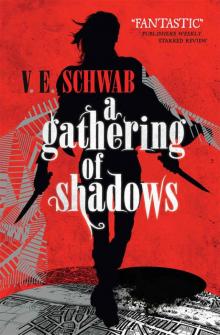 A Gathering of Shadows
A Gathering of Shadows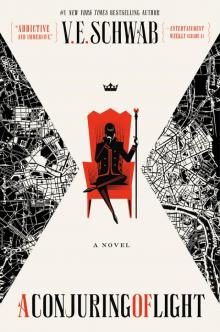 A Conjuring of Light
A Conjuring of Light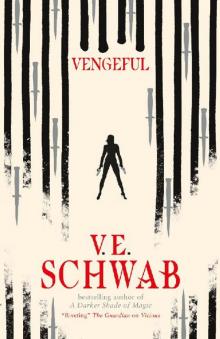 Vengeful
Vengeful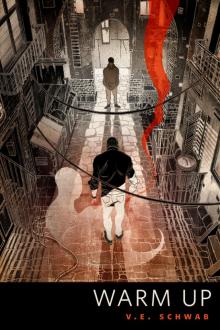 Warm Up
Warm Up The Near Witch
The Near Witch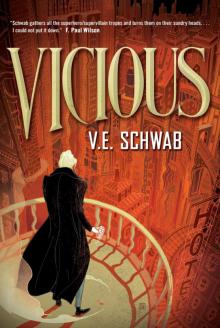 Vicious
Vicious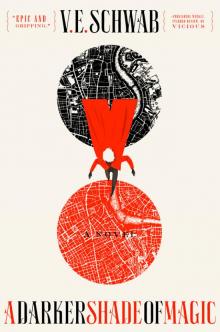 A Darker Shade of Magic
A Darker Shade of Magic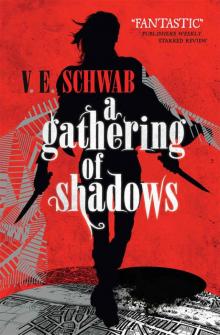 Gathering of Shadows (A Darker Shade of Magic)
Gathering of Shadows (A Darker Shade of Magic)